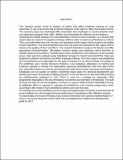| dc.description.abstract | ABSTRACT
This research project aimed at analysis of factors that affect employee training in Local authorities. It was a case study that involved employees of all cadres in Meru Municipal Council. The research project was developed after observation that employees in Local authorities were not adequately equipped with skills, abilities and knowledge for effective service delivery.
Assessing the present situation of Local authorities in terms of service delivery, it is obvious that urgent steps are required to upgrade employee skills in order to improve performance is critical. The Local authorities have over the years not responded to this urgent need to improve the quality of their workforce. The local authorities have over the years not responded to this urgent need to improve the quality of their workforce .The research intended to analyse the factors and offer appropriate recommendation. Descriptive research design was employed, which involves an indepth analysis of the factors. Questionnaires were distributed to all employees of the sampled group. Data was then analysed using Statistical Package for Social Sciences(SPSS). Data was analysed to establish the factors that affect employee training. From the study it was established that several factors are responsible for the state of training in LAs which include, the quality of the workforce, poor Human Resource Practices, Low budgetary allocations to training and employee attitude to training.The respondents expressed dissatisfaction with their jobs which they said offered them no room for personal growth, skill advancement, and career development. Employees are not guided on matters concerning future plans for personal development and training, promotion and upward mobility prospects. From the above it is clear that HRM practices are professionally employed in LAs. There is need for a strategy for systematic HRD programmes especially in the area of training, recruitment, and retention of employees. This will promote the need for annual budgetary Provision to support HRM activities especially training. A deliberate effort is required to reinstate the funding for LAs training programmes which according to this research have dwindled to almost zero over the years.
The findings and recommendations of this study will significantly contribute to advancement of service delivery in LAs through improved performance of employees after effective training. Fundamentally, the research findings have availed information key towards implementation of Kenya's Economic Blueprint Vision 2030 and accomplishment e Millennium development goals by 2012. | en_US |

